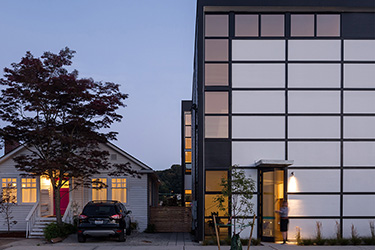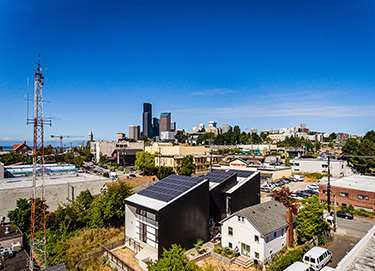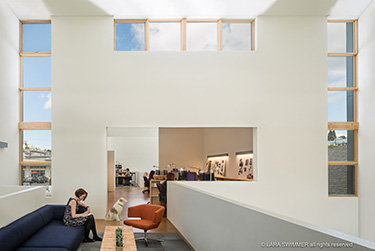|
Subscribe / Renew |
|
|
Contact Us |
|
| ► Subscribe to our Free Weekly Newsletter | |
| home | Welcome, sign in or click here to subscribe. | login |
Real Estate Buzz
| |
 Brian Miller Real Estate Editor |
January 4, 2018
On the Block: Net-zero comes to Little Saigon
The exact boundaries of Little Saigon are hard to chart, but it's messily defined as the east end of the International District. Its spine is South Jackson Street, dominated by an array of low-rise noddle shops, produce wholesalers and fading strip malls. Yet along Jackson and the new streetcar line, old family-owned warehouses like the Acme Poultry property are gradually giving way to big multifamily developers. Asian Plaza is also being redeveloped, along with Yesler Terrace to the north.
But South King Street is something of a sleepy exception, especially when you crest the street at 12th Avenue South and plunge east into a small valley. Viable holdout businesses include Lam's Seafood Market, Hau Hau Market and Thanh Son Tofu. It's not someplace you go for pho — Jackson's for that — so much a place where restauranteurs resupply their businesses.
That's why the new offices of JW Architects, at 1257 S. King St., stand out. First, the two-story structure is relatively new, having been completed in mid-2016. Julian Weber relocated his 16-person firm from Columbia City after choosing and buying a property within better bike — and foot — commute distance for his staff.
“We wanted to be in a new central location closer to where everyone lives,” he explains. Though not initially interested in the ID, “We were pleasantly surprised. I knew that this area was up-and-coming.”
He also bought the bungalow next door for his family, and plans to eventually put up a new home there. In the meantime, the two structures share a front yard, so the family dogs can more easily come over and visit.
Second, being an architect's office, it's architecturally striking — a statement and an inspiration for clients, if not neighbors. “It's very much a test case and a clear statement of our vision and goals,” says Weber. “We're kind of living our values out.” The building also picked up an honorable mention at last November's AIA Seattle Honor Awards.
Third, and this is the belated bit of news, the building was certified by the International Living Future Institute last fall as a net-zero structure. This makes it only the second stand-alone project in Seattle after the acclaimed Bullitt Center, which opened in 2013, to achieve that distinction. (A 2013 addition to the Bertschi School was also so honored.)
Touring the JWA offices on a bright December day, one could quite literally feel the building's efficiency. While cold outside, some of the upper clerestory windows were actually open to release the excess heat. This is standard practice, I was told; the windows are only closed occasionally.
The building employs high-efficiency HVAC systems, LED lighting, extra insulation, double-pane low-E windows with argon, and a heat pump and recovery system. The 24-kilowatt solar system has 77 panels on the roof, all pointed south for maximum effect.
During its 13-month evaluation period, which concluded last fall, the building generated 28,187 kilowatt hours of energy, but consumed only 18,822 kWh—representing a 33 percent savings.
The formerly vacant lot measures only 4,400 square feet, and the new building has 3,600 square feet. The south end of the building is a double-height space, 28-feet-high, lit by sawtoothed, warehouse-style skylights. The wall of windows looks toward Beacon Hill, admitting even more warmth and sunlight. “We hardly ever use our lights,” says the firm's Emily Walker. “I think we run the air conditioning on the hottest days for an hour or two.”
The north entry side has a partial mezzanine above that could—as the firm expands—be extended into a full floor.
The floors are mostly cork panels from Lumber Liquidators, carted to the site in a staffer's car. Wherever possible, wood was obtained from salvage yards and local vendors. Plywood predominates; sound baffling panels are made of ash and felt.
Weber designed the building, of course. The team also included Belotti + McHugh Design and Construction Services, general contractor; Splinter & Slag, furniture fabrication; Jaidee Weber, lighting design; S3, structural engineer; Root of Design, landscape architect; Abossein Engineering, mechanical engineer; and Evergreen Certified, energy consultant.
Weber and his staff designed and built some of the furniture in conjunction with Splinter & Slag; other pieces were sourced via Craigslist and Inform Interiors.
Weber estimates the construction cost came in at about $190 per square foot. And how much would conventional, non-net-zero have cost? Maybe $189, says Weber. “It was surprising how viable this was. It was really a marginal upgrade.” Tax credits for the solar panels and other green features also contributed to the budget. Weber estimates those efficiencies will pay for themselves in six or seven years.
Most of his firm's practice is low-rise residential—including a planned new townhouse development at King and 16th Avenue South. But, based on his experience at 1257 King, says Weber, “We would not be opposed to doing an office project with similar values.”
And Little Saigon is likely to see more such new development. Weber bought his two properties in 2015, before last year's upzone of the ID. Today, much of the swath between Interstate 5 and Rainier Avenue South is zoned up to 170 feet. Several properties nearby are listed for sale, meaning that JW Architects will likely soon have some taller new neighbors.
Got a tip? Contact DJC real estate editor Brian Miller at brian.miller@djc.com or call him at (206) 219-6517.
Previous columns:
- On the Block: Bellevue church finds a space to build 63 affordable housing units — in the parking lot, 12-28-2017
- On the Block: Tax overhaul is a jackpot for commercial real estate — but the market still rules, 12-21-2017
- On the Block: Affordable housing developers say GOP tax overhaul could be ‘earth-shattering', 12-14-2017
- On the Block: Skyway Cafe site offered for long-term lease, 12-07-2017
- On the Block: Condo tower on Trinity Parish's First Hill property to have 27 stories with 203 units, 11-30-2017
- On the Block: U Village looks like another senior housing hub, 11-16-2017
- On the Block: Lincoln Towing yard on Aurora could get an overhaul: 125 townhouses, 130 apartments, 11-09-2017
- On the Block: Kundig shows design for Urban Visions project, 11-02-2017





